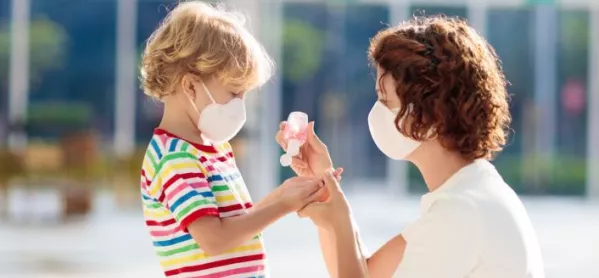- Home
- Coronavirus: ‘Denial of PPE for teachers is dodgy’
Coronavirus: ‘Denial of PPE for teachers is dodgy’

Government advice suggesting that teachers do not need personal protective equipment (PPE) when working in schools during the coronavirus pandemic is “dodgy” and “unhelpful”, a union leader has warned.
Patrick Roach, the new general secretary of the NASUWT teaching union, said a number of teachers on the front line are calling for access to PPE and Covid-19 testing as they are concerned about the health of their families.
But government guidance, updated earlier this week, said that staff in schools, colleges and nurseries “do not require” PPE.
Related: ‘Prioritise teachers for PPE and testing’
Coronavirus: Teacher protection ‘a matter of urgency’
DfE: Williamson acknowledges teacher anxiety
Teachers must instead focus on social distancing measures and handwashing to limit the spread of Covid-19.
Dr Roach said: “Our concern as a union is that in the midst of a crisis in supply and demand, guidance is being published which asserts that teachers in any setting do not require access to PPE.”
Coronavirus: Concerns about reopening schools
He added: “The reality of the matter is that practising stringent social distancing in the context of working with young children, and working
with children with moderate or profound learning difficulties, is going to be, to say the least, very challenging for a teacher.”
In a recent survey of 950 NASUWT members, nearly a third (32 per cent) of school staff said there was not adequate provision of soap and hot water for handwashing in their workplace.
Dr Roach said: ”[Teachers] are being asked, when the rest of the country is being asked to stay at home, to leave their homes on a daily basis to
support children of key workers and vulnerable children.
“We think there is an obligation on the government to listen to that concern from the profession about providing access to PPE.”
He also urged the government not to “rush” to reopen schools to all pupils until teachers had been properly consulted on the process, as he
warned that learning could be “compromised”.
Dr Roach added that asking students to return to school during the summer break, which runs from mid-July to late August, to start the
academic year early could lead to pupil burn-out.
He said: “We wouldn’t want to see children becoming casualties of this Covid-19 situation.”
His warning came as heads have suggested that schools should reopen for a period before the summer holidays, rather than September, if the
scientific advice says it is safe to do so.
Three weeks after schools closed, the NASUWT is also calling on the government to ensure that all students at home have access to broadband and resources so disadvantaged pupils do not miss out.
“Free school meals are only one part of the diet that is served up in school. Learning is the other part of the diet and for many children
from poor households access to technology may not be there. Government needs to be concerned about that and do something about it,” said Dr Roach.
A Department for Education spokesman said: “We will reopen schools when the scientific advice indicates it is safe to do so.
“Teachers and school staff are an essential part of our fight against coronavirus. We will continue to work with the sector to ensure they receive the support they need over the challenging weeks and months ahead.”
Register with Tes and you can read two free articles every month plus you'll have access to our range of award-winning newsletters.
Keep reading with our special offer!
You’ve reached your limit of free articles this month.
- Unlimited access to all Tes magazine content
- Save your favourite articles and gift them to your colleagues
- Exclusive subscriber-only stories
- Over 200,000 archived articles
- Unlimited access to all Tes magazine content
- Save your favourite articles and gift them to your colleagues
- Exclusive subscriber-only stories
- Over 200,000 archived articles



